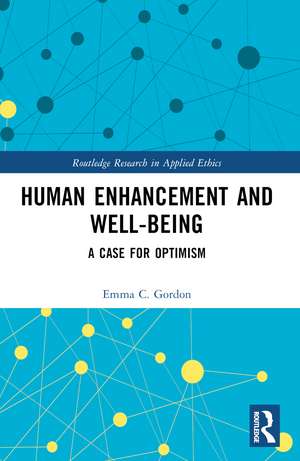Human Enhancement and Well-Being: A Case for Optimism: Routledge Research in Applied Ethics
Autor Emma C. Gordonen Limba Engleză Paperback – 26 aug 2024
This book has two main aims. First, it outlines and criticises the six main contemporary arguments for scepticism about the role of human enhancements in promoting well-being. These arguments concern, respectively, (i) the value of achievements, (ii) freedom, (iii) hyperagency, (iv) human nature, (v) authenticity, and (vi) inequality. It will be shown – for the first time in a book-length treatment – why the overarching bioconservative case against enhancement doesn’t hold water. The second central aim of the book is positive; as we’ll see, each of the bioconservative critiques considered and rejected will be shown to nonetheless motivate a distinctive kind of theoretical desideratum that a viable positive enhancement proposal should satisfy. The remainder of the book then defends a two-part enhancement proposal that will be shown to clearly satisfy the theoretical desiderata that emerged from reflecting on the earlier critique of bioconservativism. The first part of the positive proposal motivates and outlines the general role of an enhancement counsellor in facilitating voluntary enhancement; I then offer an applied case study of this role in the special case of enhancement for the purpose of facilitating romantic and parental relationships.
Human Enhancement and Well-Being: A Case for Optimism will be of interest to scholars and advanced students working in applied ethics, bioethics, philosophy of technology, philosophy of well-being, and social epistemology.
Din seria Routledge Research in Applied Ethics
- 9%
 Preț: 934.96 lei
Preț: 934.96 lei -
 Preț: 313.01 lei
Preț: 313.01 lei - 9%
 Preț: 935.57 lei
Preț: 935.57 lei -
 Preț: 327.22 lei
Preț: 327.22 lei -
 Preț: 294.29 lei
Preț: 294.29 lei -
 Preț: 309.79 lei
Preț: 309.79 lei -
 Preț: 389.38 lei
Preț: 389.38 lei - 18%
 Preț: 890.74 lei
Preț: 890.74 lei - 18%
 Preț: 1003.61 lei
Preț: 1003.61 lei -
 Preț: 387.42 lei
Preț: 387.42 lei -
 Preț: 392.37 lei
Preț: 392.37 lei -
 Preț: 311.61 lei
Preț: 311.61 lei -
 Preț: 385.08 lei
Preț: 385.08 lei - 18%
 Preț: 999.97 lei
Preț: 999.97 lei - 17%
 Preț: 258.50 lei
Preț: 258.50 lei - 21%
 Preț: 257.68 lei
Preț: 257.68 lei - 18%
 Preț: 1000.27 lei
Preț: 1000.27 lei -
 Preț: 389.70 lei
Preț: 389.70 lei -
 Preț: 387.75 lei
Preț: 387.75 lei -
 Preț: 385.25 lei
Preț: 385.25 lei -
 Preț: 397.16 lei
Preț: 397.16 lei - 26%
 Preț: 764.34 lei
Preț: 764.34 lei -
 Preț: 383.68 lei
Preț: 383.68 lei -
 Preț: 385.84 lei
Preț: 385.84 lei - 21%
 Preț: 257.23 lei
Preț: 257.23 lei - 18%
 Preț: 993.49 lei
Preț: 993.49 lei -
 Preț: 388.90 lei
Preț: 388.90 lei - 18%
 Preț: 1005.67 lei
Preț: 1005.67 lei -
 Preț: 389.38 lei
Preț: 389.38 lei - 31%
 Preț: 762.58 lei
Preț: 762.58 lei -
 Preț: 407.01 lei
Preț: 407.01 lei
Preț: 381.00 lei
Nou
Puncte Express: 572
Preț estimativ în valută:
72.91€ • 75.84$ • 60.19£
72.91€ • 75.84$ • 60.19£
Carte tipărită la comandă
Livrare economică 15-29 aprilie
Preluare comenzi: 021 569.72.76
Specificații
ISBN-13: 9780367707859
ISBN-10: 0367707853
Pagini: 134
Dimensiuni: 152 x 229 mm
Greutate: 0.25 kg
Ediția:1
Editura: Taylor & Francis
Colecția Routledge
Seria Routledge Research in Applied Ethics
Locul publicării:Oxford, United Kingdom
ISBN-10: 0367707853
Pagini: 134
Dimensiuni: 152 x 229 mm
Greutate: 0.25 kg
Ediția:1
Editura: Taylor & Francis
Colecția Routledge
Seria Routledge Research in Applied Ethics
Locul publicării:Oxford, United Kingdom
Public țintă
Academic, Postgraduate, and Undergraduate AdvancedCuprins
1. Introduction
2. The Case for Bioconservativism I: Achievement, Freedom, and Hyperagency
3. The Case for Bioconservativism II: Human Nature, Authenticity, and Inequality
4. Key Desiderata, Constraints, Methods
5. Facilitating Enhancement: The Central Role of Counselling
6. Enhancement in Practice: Loving Relationships
2. The Case for Bioconservativism I: Achievement, Freedom, and Hyperagency
3. The Case for Bioconservativism II: Human Nature, Authenticity, and Inequality
4. Key Desiderata, Constraints, Methods
5. Facilitating Enhancement: The Central Role of Counselling
6. Enhancement in Practice: Loving Relationships
Notă biografică
Emma C. Gordon is a Lecturer in Applied Ethics at the University of Glasgow, UK. Her expertise is mainly in applied ethics (especially bioethics) and social epistemology. Her work has appeared in such places as Ethical Theory and Moral Practice, Bioethics, The Journal of Applied Philosophy, Neuroethics, and Philosophical Psychology.
Descriere
This book outlines and criticises the six main contemporary arguments for scepticism about the role of human enhancements in promoting well-being. It also defends important and concrete ways in which enhancement-permissive policies should be embraced with the aim of promoting well-being.
